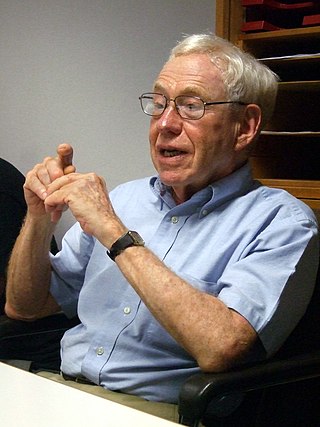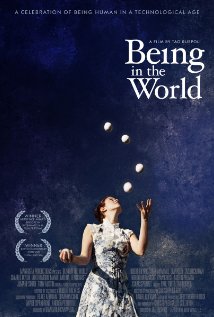Taylor Carman (born 1965) is an American philosopher. He is a professor of philosophy at Barnard College, Columbia University.
Taylor Carman (born 1965) is an American philosopher. He is a professor of philosophy at Barnard College, Columbia University.
Carman earned his Ph.D. in philosophy from Stanford University, where he worked with Dagfinn Føllesdal, but was also influenced by Hubert Dreyfus.
Carman's main areas of interest are in the philosophy of Martin Heidegger and in phenomenology. He is the author of Heidegger’s Analytic: Interpretation, Discourse, and Authenticity in Heidegger's Being and Time (2003) and Merleau-Ponty (2008), and the editor of The Cambridge Companion to Merleau-Ponty (2005). He is also co-editor of a philosophy series with Ashgate Publishing called "Intersection: Continental and Analytic Philosophy".
Hubert Dreyfus considered Carman to be one of the leading contemporary authorities on Heidegger and on Heidegger's concept of death in particular. [1] Carman was featured, along with Dreyfus, Charles Taylor, Albert Borgmann, Mark Wrathall and Sean Kelly, in the documentary Being in the World (2010), which explores the phenomenology of everyday life. [2]

Maurice Jean Jacques Merleau-Ponty was a French phenomenological philosopher, strongly influenced by Edmund Husserl and Martin Heidegger. The constitution of meaning in human experience was his main interest and he wrote on perception, art, politics, religion, biology, psychology, psychoanalysis, language, nature, and history. He was the lead editor of Les Temps modernes, the leftist magazine he established with Jean-Paul Sartre and Simone de Beauvoir in 1945.

Martin Heidegger was a German philosopher who is best known for contributions to phenomenology, hermeneutics, and existentialism. He is among the most important and influential philosophers of the 20th century. He has been widely criticized for supporting the Nazi Party after his election as rector at the University of Freiburg in 1933, and there has been controversy about the relationship between his philosophy and Nazism.
Phenomenology is the philosophical study of the structures of experience and consciousness. As a philosophical movement it was founded in the early years of the 20th century by Edmund Husserl and was later expanded upon by a circle of his followers at the universities of Göttingen and Munich in Germany. It then spread to France, the United States, and elsewhere, often in contexts far removed from Husserl's early work.

Being and Time is the 1927 magnum opus of German philosopher Martin Heidegger and a key document of existentialism. Being and Time had a notable impact on subsequent philosophy, literary theory and many other fields. Though controversial, its stature in intellectual history has been compared with works by Kant and Hegel. The book attempts to revive ontology through an analysis of Dasein, or "being-in-the-world." It is also noted for an array of neologisms and complex language, as well as an extended treatment of "authenticity" as a means to grasp and confront the unique and finite possibilities of the individual.

Hubert Lederer Dreyfus was an American philosopher and professor of philosophy at the University of California, Berkeley. His main interests included phenomenology, existentialism and the philosophy of both psychology and literature, as well as the philosophical implications of artificial intelligence. He was widely known for his exegesis of Martin Heidegger, which critics labeled "Dreydegger".
Neurophenomenology refers to a scientific research program aimed to address the hard problem of consciousness in a pragmatic way. It combines neuroscience with phenomenology in order to study experience, mind, and consciousness with an emphasis on the embodied condition of the human mind. The field is very much linked to fields such as neuropsychology, neuroanthropology and behavioral neuroscience and the study of phenomenology in psychology.
Existential phenomenology encompasses a wide range of thinkers who take up the view that philosophy must begin from experience like phenomenology, but argues for the temporality of personal existence as the framework for analysis of the human condition.
Architectural phenomenology is the discursive and realist attempt to understand and embody the philosophical insights of phenomenology within the discipline of architecture. The phenomenology of architecture is the philosophical study of architecture employing the methods of phenomenology.

Phenomenology of Perception is a 1945 book about perception by the French philosopher Maurice Merleau-Ponty, in which the author expounds his thesis of "the primacy of perception". The work established Merleau-Ponty as the pre-eminent philosopher of the body, and is considered a major statement of French existentialism.
John Sallis is an American philosopher well known for his work in the tradition of phenomenology. Since 2005, he has been the Frederick J. Adelmann Professor of Philosophy at Boston College. He has previously taught at Pennsylvania State University (1996–2005), Vanderbilt University (1990–1995), Loyola University of Chicago (1983–1990), Duquesne University (1966–1983) and the University of the South (1964–1966).
Samuel Todes was an American philosopher who made notable contributions to existentialism, phenomenology, and philosophy of mind.
In Being and Time, the philosopher Martin Heidegger made the distinction between ontical and ontological, or between beings and "being" as such. He labeled this the "Ontological Difference." It is from this distinction that he developed the concept of "Fundamental Ontology."
John Russon is a Canadian philosopher, working primarily in the tradition of Continental Philosophy. In 2006, he was named Presidential Distinguished Professor at the University of Guelph, and in 2011 he was the Shastri Indo-Canadian Institute's Canadian Lecturer to India.

Mark Wrathall is Professor of Philosophy at the University of Oxford and a fellow and tutor at Corpus Christi College, Oxford. He is considered a leading interpreter of the philosophy of Martin Heidegger. Wrathall is featured in Tao Ruspoli's film Being in the World. According to a recent reviewer of Wrathall's latest book, "Wrathall's writing is clear and comprehensive, ranging across virtually all of Heidegger's collected works.... Wrathall's overall interpretation of Heidegger's work is crystal clear, compelling, and relevant."
The Society for Phenomenology and Existential Philosophy (SPEP) is a philosophical society whose initial purpose was to promote the study of phenomenology and existentialism but has since expanded to a wide array of contemporary philosophical pursuits, including critical theory, feminist philosophy, poststructuralism, critical race theory, and increasingly non-Eurocentric philosophies. SPEP was created in 1962 by American philosophers who were interested in Continental philosophy and were dissatisfied with the analytic dominance of the American Philosophical Association. It has since emerged as the second most important philosophical society in the United States. Alan D. Schrift and Shannon Sullivan are the current Executive Co-Directors of SPEP.
Fred Evans is an American philosopher. He is a Professor of philosophy at Duquesne University and Director of the Center for Interpretative and Qualitative Research. His research and teaching interests are in contemporary continental philosophy, social and political philosophy, and philosophy of language, psychology and technology.

Leonard "Len" Lawlor is Edwin Erle Sparks Professor of Philosophy at Pennsylvania State University. He specializes in nineteenth- and twentieth-century Continental philosophy.

Being in the World is a 2010 documentary film directed by Tao Ruspoli. The film is based on Martin Heidegger's philosophy and is inspired by Hubert Dreyfus. It features a number of prominent philosophers.

Edward S. Casey is an American philosopher and university professor. He has published several volumes on phenomenology, philosophical psychology, and the philosophy of space and place. His work is widely cited in contemporary continental philosophy. He is currently Distinguished Professor of Philosophy at Stony Brook University in New York and distinguished visiting faculty at Pacifica Graduate Institute.